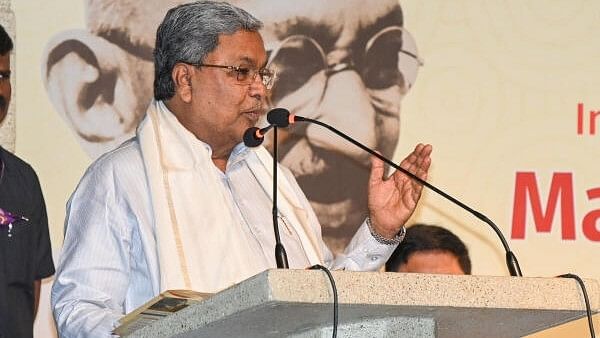
Karnataka CM Siddaramaiah
Credit: DH File Photo
Bengaluru: In a major setback to Chief Minister Siddaramaiah, the High Court of Karnataka on Tuesday upheld Governor Thaawarchand Gehlot’s decision to approve an investigation against him in the MUDA site allotment case.
It has been alleged that rules were bent when the Mysuru Urban Development Authority (MUDA) allotted 14 posh sites to Siddaramaiah’s wife, Parvathy B M, in exchange for the land acquired from her.
Acting on three private complaints filed by T J Abraham, Snehamayi Krishna and Pradeep Kumar S P, the Governor on August 16 approved an investigation under Section 17A of the Prevention of Corruption Act. Siddaramaiah petitioned the HC against this.
Dismissing the petition, Justice M Nagaprasanna ruled that the facts would undoubtedly require an investigation since the beneficiary of all the acts was not anybody outside, but the wife of the petitioner.
Credit: Sajith Kumar
“If this were to be a case of a common man, he would not have fought shy of facing the investigation. In the opinion of the court, the CM, a leader of the proletariat, the bourgeois and of any citizen, should not fight shy of any investigation. There is lurking suspicion, looming allegations, and the beneficiary of Rs 56 crore is the family of the chief minister — the petitioner. Judged from these spectra and analysed from the aforesaid premises, the irresistible conclusion is, an investigation becomes necessary,” the judge ruled.
The chief minister challenged the Governor’s order primarily on non-application of mind, arguing that throughout the period of allegations, Siddaramaiah did not put a dot of ink on any paper concerning the issue nor was the file placed before him at any time when he was in power.
On the question of application of mind, the court said the gubernatorial order nowhere suffers from want of application of mind.
It perused the entire file maintained in the secretariat of the Governor, the documents that run into 1,200 pages, and said the order bears abundance of application of mind.
The court further noted though normally the Governor acts on the aid and advice of the Council of Ministers under Article 163, exceptionally he need not be bound by it.
“One such exception is the sanction/approval against the Chief Minister.”
The court further stated that Siddaramaiah may not have put his signature, made a recommendation or taken a decision, for bringing him under the ambit of Section 17A, but the beneficiary is not a stranger.
The court pointed out rules were bent for the 50:50 allotment scheme but withdrawn after the sale deeds for 14 sites in favour of Parvathy were executed.
“How and why the rule was bent in favour of the family of the chief minister is what is required to be investigated. If this does not require investigation, I fail to understand what other case can merit investigation, as the beneficiary is the family of the petitioner and the benefit is by leaps and bounds, it is in fact a windfall,” Justice Nagaprasanna said.
The court also said: “If the beneficiary were to be a stranger, this court would have shown the complainants their door of exit, while it is not. The beneficiary is the family of the petitioner, not today, right from 2004, the day on which the brother-in-law (of Siddaramaiah) purchases the property and more so, from 2010 when he gifts the property to the wife (Parvathy) of the petitioner. Even if it is taken that there are allegations from 2010, it would suffice for an investigation...”